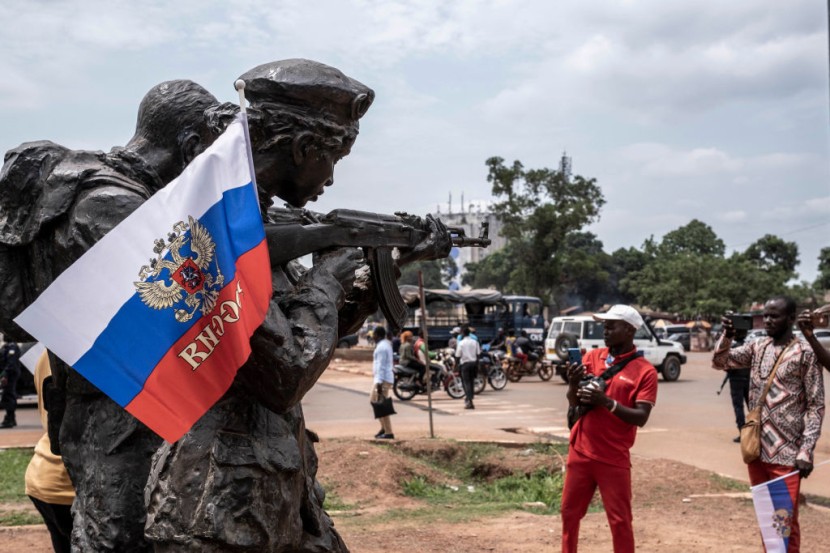Russia has been offering governments in Africa a "regime survival package" in exchange for access to strategically important natural resources, as well as to change their mining laws, specifically in West Africa, to dislodge Western companies from an area of strategic importance.
Internal Russian government documents seen by the BBC and a new report by the Royal United Services Institute (RUSI) revealed that the measures were part of the process of the Russian government taking over the businesses of the Wagner mercenary group, which was broken up after a failed coup in June 2023 and the death of the contractor firm's leader, Yevgeny Prigozhin.

Securing Russia's African Foothold
Wagner's multibillion-dollar operations have now been mostly run by the Russian "Expeditionary Corps," allegedly managed by the man accused of being behind the attempt to kill Sergei Skripal using the Novichok nerve agent on the streets of the UK - a charge Russia has denied.
"This is the Russian state coming out of the shadows in its Africa policy," RUSI land warfare specialist Jack Watling said.
Watling is one of several authors of a report highlighting the Kremlin's takeover of Wagner's assets and legitimizing its hegemony in Africa, specifically in the coup-stricken Sahel.
Control of Wagner's assets was to be handed to Gen. Andrey Averyanov, commander of Unit 29155, a secretive operation specializing in targeting killings and destabilizing foreign governments.
However, instead of assassinations and destabilizations, Averyanov was in the business of securing the future of African governments as long as they paid by signing away their mineral rights.
"[T]here was a meeting in the Kremlin fairly shortly after Prigozhin's mutiny, in which it was decided that Wagner's Africa operations would fall directly under the control of Russian military intelligence, the GRU," Watling told the BBC.
Read Also : Navalny's Wife Alleges Russia Is 'Hiding His Body,' Pledges to Carry on Husband's Battle Against Putin
Bears in the Sahel
In early September, Averyanov and Russian Deputy Defense Minister Yunus-Bek Yevkurov made a tour of former Wagner operations in Africa, specifically Libya, Burkina Faso, the Central African Republic, Mali, and Niger.
Readouts of various meetings demonstrated that the two men were reassuring Wagner's partners on the continent that Prigozhin's death was not the end of his business deals but rather a strengthening of such.
In one of the meetings, the Russian officials told a Burkinabe officer that the cooperation between the two nations would continue in "the military domain, including the training of Burkinabe officer cadets and officers at all levels, including pilots in Russia."
Burkina Faso, alongside Mali and Niger, have become Wagner's biggest clients. With the Kremlin's takeover of Wagner operations in their countries - which have all since been controlled by military juntas, purged all French and Western influence in their countries and established its own bloc called the "Alliance of Sahel States" in response to ECOWAS - also meant that they would be inheriting the issues the countries face, specifically Mali's Islamist insurgency.
"The French were tolerated, rather than welcomed," Amber Advisers African politics analyst Edwige Sorgho-Depagne said. "The French mandate to help in the terror crisis in the Sahel was always regarded as limited in time. So, the fact that the French stayed for that long - over 10 years - without finding a way to end the crisis didn't help."
Russian influence in Africa has also been deep-seated than most observers think.
Sorgho-Depagne explained that Soviet military advisors and instructors were present in the region during the 1970s and 1980s.
"There's this dream of getting back to a better time, which is often associated with the relationship with Russia," she added.
The return of Russian troops in Africa meant that the Sahel juntas would stay in power indefinitely and prolong what some observers call human rights abuses on the continent, with Watling describing Russia's "Expeditionary Corps" as a rebranding of Wagner, or in Watling's words, "Wagner 2.0."
One of the most well-documented incidents of Wagner violence took place in the central Malian town of Moura where, according to a UN report, at least 500 people were believed to have been summarily executed by Malian troops and "armed white men," whom eyewitnesses described as speaking an "unknown language."
While independent verification has not been possible, Human Rights Watch identified the unknown white attackers as Russian mercenaries.
Related Article : Russia Recruiting Wagner Veterans to Fight Ukraine
© 2025 HNGN, All rights reserved. Do not reproduce without permission.








